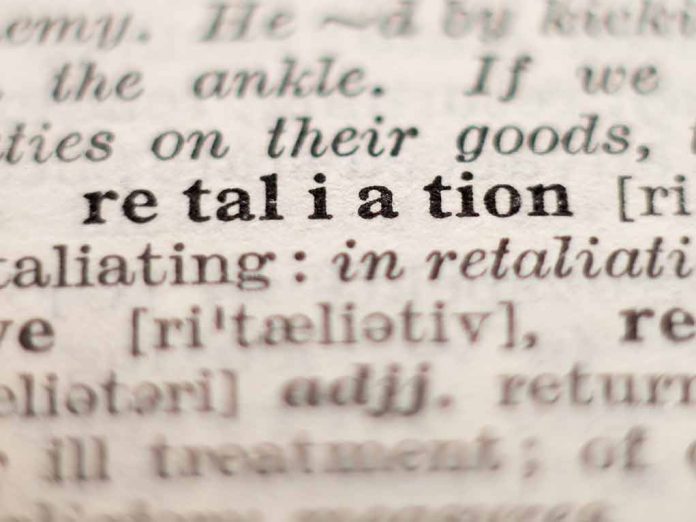
California State Senator Marie Alvarado-Gil’s switch from the Democratic to the Republican party has sparked controversy, leading to her removal from the Latino Caucus and stripping of committee assignments.
At a Glance
- Senator Alvarado-Gil switched from Democratic to Republican party mid-session
- She was removed from the Latino Caucus and lost committee assignments
- Democrats cite party balance reasons; Alvarado-Gil claims retribution
- The incident highlights conflicts within the Latino Caucus and broader implications for Latino representation
- Recent polls show shifting Latino voter preferences in California
Party Switch Sparks Controversy
California State Senator Marie Alvarado-Gil’s recent decision to switch from the Democratic to the Republican party has ignited a firestorm of controversy in the state’s political landscape. The move resulted in her immediate removal from the Latino Caucus and the stripping of her committee assignments, actions that have raised questions about political retribution and the nature of Latino representation in California politics.
Alvarado-Gil, representing one of California’s most conservative rural districts, claims the actions taken against her were punitive. “In a stunning display of political retribution, Democrats in the California State Senate have responded to Senator Alvarado-Gil’s decision to leave the Democratic Party by stripping her of all her committee assignments and removing her from the Latino Caucus,” Alvarado-Gil’s office stated.
Democrats Defend Actions
Senate Democratic leaders, however, maintain that the changes were necessary to maintain appropriate party balance in committees. Senate President pro-Tempore Mike McGuire explained, “Given Senator Alvarado-Gil’s party affiliation change, we have removed her from committees and will be re-evaluating the balance of our Democratic and Republican committee memberships in the days ahead to ensure they reflect the balance of representation in the Senate.”
The California Latino Legislative Caucus expressed disappointment over Alvarado-Gil’s party switch, citing concerns about the Republican party’s stance on Latino issues. This reaction underscores the complex relationship between party affiliation and ethnic advocacy groups in California politics.
Implications for Latino Representation
The incident has brought to light ongoing conflicts within the Latino Caucus concerning political commitments and representation. The Caucus, established 50 years ago to advocate for the Latino community’s interests, now faces questions about its ability to accommodate diverse political viewpoints within the Latino community.
CAGOP Chair Jessica Patterson criticized the Latino Caucus for not accepting diverse viewpoints, highlighting the tension between party loyalty and ethnic representation. This controversy occurs against a backdrop of shifting Latino voter preferences, with recent polls showing increasing support for Republican candidates among Latino voters in California.
Proving yet again that the @LatinoCaucus is code for @CA_Dem Latino Caucus.
Anyone Latino who dares think differently than they do need not apply. As @CAGOP Chair and a proud Latina, I’m disgusted. https://t.co/DSzzv0zN7w— Jessica Millan Patterson (@millanpatterson) August 9, 2024
Broader Implications for Latino Politics
The Alvarado-Gil case reflects broader trends and challenges in Latino politics nationwide. While Latino political influence is increasingly recognized in U.S. elections, with both parties making efforts to engage Latino voters, the concept of a unified “Latino vote” remains debated.
This incident serves as a reminder of the complex interplay between ethnic identity, party affiliation, and political representation. As the Latino population continues to grow and diversify, political parties and advocacy groups will need to navigate these complexities to effectively represent the interests of Latino communities.
Looking Ahead
As California’s political landscape continues to evolve, the Alvarado-Gil case may signal future changes in voter alignments and party strategies. The incident highlights the need for political institutions to adapt to the changing demographics and diverse political views within the Latino community. It also underscores the ongoing challenge of balancing party loyalty with the representation of specific ethnic or community interests in American politics.
Sources:
- California State Sen. removed from Latino Caucus for switching to GOP
- California Latino Legislative Caucus
- Latino Civic and Political Participation
- Latino representation in U.S. legislatur esentation in U.S. legislatures: inter es: interests, beha ests, behavior, and influence
- Northern California state senator switches to Republican Party after years as a Democrat
- California’s Latino voters helped turn state blue. Will others catch the wave?
- California state senator defects to Republican Party: ‘Democratic Party is not the party that I signed up for’






















